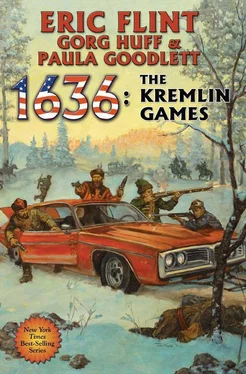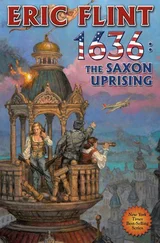Eric Flint - 1636:The Kremlin games
Здесь есть возможность читать онлайн «Eric Flint - 1636:The Kremlin games» весь текст электронной книги совершенно бесплатно (целиком полную версию без сокращений). В некоторых случаях можно слушать аудио, скачать через торрент в формате fb2 и присутствует краткое содержание. Жанр: Альтернативная история, на английском языке. Описание произведения, (предисловие) а так же отзывы посетителей доступны на портале библиотеки ЛибКат.
- Название:1636:The Kremlin games
- Автор:
- Жанр:
- Год:неизвестен
- ISBN:нет данных
- Рейтинг книги:4 / 5. Голосов: 1
-
Избранное:Добавить в избранное
- Отзывы:
-
Ваша оценка:
- 80
- 1
- 2
- 3
- 4
- 5
1636:The Kremlin games: краткое содержание, описание и аннотация
Предлагаем к чтению аннотацию, описание, краткое содержание или предисловие (зависит от того, что написал сам автор книги «1636:The Kremlin games»). Если вы не нашли необходимую информацию о книге — напишите в комментариях, мы постараемся отыскать её.
1636:The Kremlin games — читать онлайн бесплатно полную книгу (весь текст) целиком
Ниже представлен текст книги, разбитый по страницам. Система сохранения места последней прочитанной страницы, позволяет с удобством читать онлайн бесплатно книгу «1636:The Kremlin games», без необходимости каждый раз заново искать на чём Вы остановились. Поставьте закладку, и сможете в любой момент перейти на страницу, на которой закончили чтение.
Интервал:
Закладка:
They went back to the maps.
The map they were looking at was a copy of one that had been sent to the Dacha, which was a copy of one in Grantville. They were fair copies, though. And features like rivers were clear enough. The place where the Ufa River…
Tim spoke up. “We have a problem, Your Majesty, and its name is steamboats. Steamboats in the last two years-but especially in the last year-have increased the goods transported on the Volga. They kept us supplied at Rzhev and by now they can move armies. Small armies, but still armies. If we go near a river, especially one that connects to the Volga, and most of them do, it will be easy to send an army after us.”
“We have two problems,” the up-timer said. “Contradictory problems. We want a place where those who want to can follow us and we want a place where the czar’s family can be safe from pursuit.”
“I wish my friend Ivan were here. He’s better at this than I am,” Tim said. “He’s stationed at Bor where they’re building the dirigibles.”
“Then we’ll be seeing him fairly soon,” Czar Mikhail said. “As I said, it is our intent to take possession of the Czarina Evdokia.”
“Well, then he will be able to help us. But what do we tell the people here?”
“Send them to Ufa, those who aren’t going with us. There’s a fort there, built by Ivan the Terrible in 1574 and a town that grew up around it. It may not be where we end up, but it’s a place to gather,” the czar said. “The steam barges can get there I know, because I took one to see it last year.”
“Which means that Sheremetev can load an army on steamboats and take it there,” Czarina Evdokia said.
“There is that, but I think we must take the chance,” Czar Mikhail said. “Perhaps Tim’s clever friend, the baker’s son, will have a better option.”
Tim just listened as much as anything, shocked by the fact that the czar knew who Ivan was.
Natasha left them to work out the details and called for her factor, who was supposed to have been managing this part of her family estates.
“So, Pavel.”
“Princess.” Pavel looked uneasy, as well he should.
“You turned my estate over to the Sheremetevs. I’d like to know why. Did they pay you?”
“Your Highness, they had all the proper forms endorsed by the Boyar Duma. To disobey would have been treason. They threatened me,” Pavel said. “And my family. What was I to do? Your brother has been gone from Russia for years and…”
Pavel hesitated and Natasha thought that he was about to complain about her not taking a husband to manage the family’s wealth properly. It was a complaint he had made before, several times. Pavel was a very capable man who had been quick to adopt the innovations and new industries made possible by the Dacha, which was why he still had the job despite Natasha’s annoyance at his attitude.
But instead he just said, “You were out of touch. And the work must go on. I had no instructions to the contrary.”
“Very well. Give me a report on what has been happening since we last talked,” Natasha said.
It was a long report and much of it wasn’t very pleasant hearing. Many of the reforms that she had made under the influence of Bernie, and increasingly the influence of Anya, Filip and Father Kiril, had been reversed. The bonuses for good work and good ideas, the improved working conditions and pay, had been stopped and some of them had even been backtracked, treated as though they were loans, not payment, making greater debt that the serfs owed her. Then there was the diversions of funds, prices much too high paid to the Sheremetev clan for too little goods of too little quality and goods produced here sold to Sheremetev connections for kopeck’s on the ruble. “Director-General” Sheremetev and his greedy family hadn’t chopped off the head of the golden goose, but they were halfway to strangling the poor bird in trying to squeeze extra eggs from it.
As she listened she was forced to a realization. She couldn’t save it. The industrial base that she had been working to build here wasn’t something she could defend from Sheremetev. Even the estates and lands that had been her family’s for generations would be lost, at least temporarily, and the knowledge of that loss almost ripped the heart out of her. At the same time, this was strangely liberating. The family lands were gone, the serfs and other workers who made those lands productive would not be owned by her family, no matter what she did. The only question was who would get them. When it finally came, the decision to free her serfs from their ties to the land was easy. Better they should belong to themselves than Sheremetev, much better.
“Very well,” Natasha said. “There is a proclamation I must make and legal documents that I need drawn up.”
When the nature of those legal documents was made clear to him, Pavel had a fit. He explained that Natasha was a spoiled little girl and that no man would be so foolish, not even her idiot of a brother who married a peasant. He was, in fact, so angry that his thoughts about the innovations, at least the nontechnical innovations came boiling out. That she was wasting her family’s heritage was clear. That the peasants that she showered useless and expensive gifts on would work harder with a touch of the lash instead. Natasha was tempted to give Pavel a touch of the lash, but she restrained herself. She needed to hear this. She especially needed to hear who else among her factors and agents felt this way.
So she listened meekly, like a school girl taking her deserved scolding. And Pavel, in his anger and desperation, poured out quite a bit she needed to know.
Then she had him arrested.
Another clerk was called and the proclamations were drawn up. All the serfs on all the Gorchakov lands had all their debts to the Gorchakov family forgiven. They were, if they chose to be, released from their bonds to the land and were asked to join Natasha in the east where they would build together a new land of free people. Those who chose to stay on her lands were welcome to do so, but should be warned that those who would likely seize her lands were less likely to respect her decrees in regards to the serf’s debts. Having had her documents written up, she took them off to be examined by the czar.
Meanwhile, the clerk who had taken down the documents took himself off to repeat their contents to anyone who would listen.
The czar, the czarina, and his ad hoc Duma of Bernie, Anya, Filip, Kiril, and Tim, listened to her plan with varying degrees of shock. Tim was flabbergasted and honestly thought it was a horrible idea. Not without reason. The serfs would run, some to the east following Natasha sure enough, but others into banditry among the Cossacks. And as word spread of what she had done, other serfs would run, hoping to hide among hers. The nation would collapse. Anarchy would rule and Russia would burn.
“Perhaps,” said Filip. “In fact, I suspect you’re quite right. But it won’t be better for waiting. Serfdom eats at Russia like a tape worm, sapping the nation’s strength and killing its greatness unborn. And the longer we wait before seizing freedom, the less we will know how to handle it when we finally gain it.”
He smiled, then. “If nothing else, Your Majesty, you can form a legitimate Cossack state.” Filip waved his hand toward the east. “Somewhere out there.”
Mikhail Romanov looked like he’d eaten something profoundly distasteful. Cossacks were outlaws, bandits, renegades.
On the other hand…
The czarina, it turned out, agreed with Natasha and Filip. So, that possible obstacle eliminated, the czar cosigned and endorsed her proclamation and did her one better. He invited all the Russians who would be free to join them in the east at the fortress at Ufa. Then, for almost the first time in his tenure as czar, Mikhail made a speech. In the speech he didn’t command, didn’t even implore, but simply offered. “Come with me to the east and freedom,” Mikhail said. “Come with me if you dare. Take every steam engine you can find and put it on anything that will float and follow me to Ufa. Help me build a Russia free of serfdom.”
Читать дальшеИнтервал:
Закладка:
Похожие книги на «1636:The Kremlin games»
Представляем Вашему вниманию похожие книги на «1636:The Kremlin games» списком для выбора. Мы отобрали схожую по названию и смыслу литературу в надежде предоставить читателям больше вариантов отыскать новые, интересные, ещё непрочитанные произведения.
Обсуждение, отзывы о книге «1636:The Kremlin games» и просто собственные мнения читателей. Оставьте ваши комментарии, напишите, что Вы думаете о произведении, его смысле или главных героях. Укажите что конкретно понравилось, а что нет, и почему Вы так считаете.











